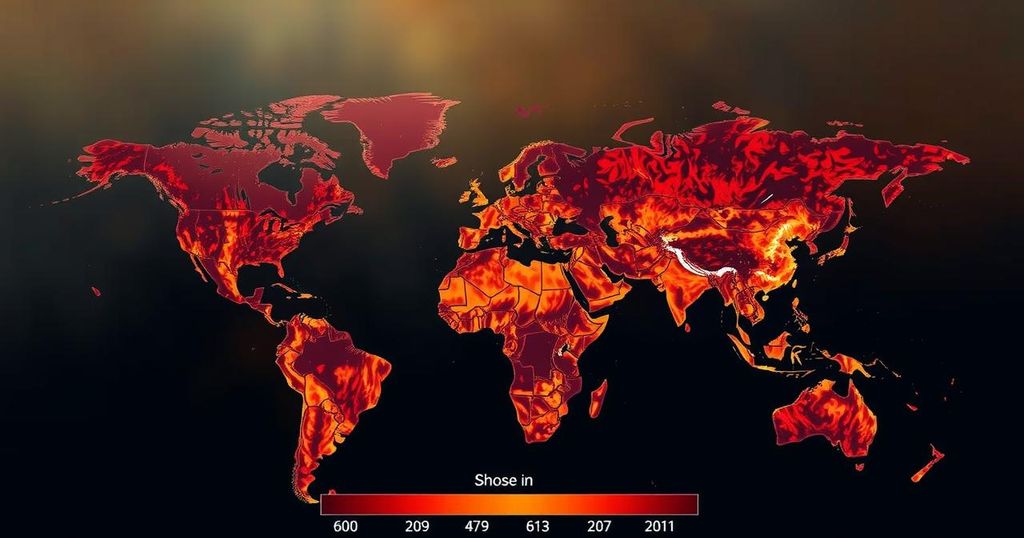Impact of Climate Change on Wildfires and Public Health: A Global Analysis
Research links climate change to an increase in wildfires and smoke-related deaths, revealing a significant rise in fatalities over recent decades. Studies indicate that while regions like Africa see fewer fires due to human activity, areas like California and Siberia experience more. The overwhelming influence of climate change on wildfires necessitates immediate action to reduce greenhouse gases and manage landscapes effectively.
Recent research has established a direct correlation between climate change and the escalating frequency as well as intensity of wildfires globally. This phenomenon has been linked to a considerable rise in smoke-related fatalities in recent decades. Two independent studies involving researchers from Dalhousie University, Belgium, the United Kingdom, and Japan have delved into the prevalence of wildfires and their adverse implications on human health, revealing disturbing trends. In contrast to the 669 estimated wildfire smoke-related deaths per year recorded in the 1960s, this figure surged to approximately 12,566 in the 2010s. One of the studies, published in the journal Nature Climate Change, contrasts wildfire models that incorporate the effects of climate change with those that do not. The findings indicate a notable increase in both the frequency and intensity of wildfires, particularly affecting sensitive ecosystems in regions such as the African savannas, Australia, and Siberia. However, the studies also highlight regional variances. For example, in Africa—where nearly 70 percent of the world’s burned area is located—there has been a decline in wildfires attributed to human activities and land fragmentation that inhibit the spread of fires. In juxtaposition, areas like California and Siberia are witnessing an uptick in wildfires, driven by prolonged droughts and heightened temperatures connected to climate change. As articulated by Dr. Sian Kou-Giesbrecht, an associate professor in the Department of Earth and Environmental Sciences at Dalhousie, “The study is important because it shows and quantifies the influence of climate change on increasing wildfires worldwide, especially given the impacts of wildfire on society and its feedback to climate change.” The research teams employed models considering variables such as climate, vegetation, and population density. They assert that while human interventions such as fire suppression and land management may mitigate wildfire occurrence, these efforts are insufficient to counterbalance the overwhelming influence of climate change, particularly during years marked by extreme weather events. Seppe Lampe, a climate scientist at Vrije Universiteit Brussel, noted, “What is striking is that in periods with low to moderate numbers of fires, direct human interventions have a large effect. However, in periods with many fires, the effect of climate change dominates, meaning that in these cases we lose control.” Moreover, the simulations reflect that climate change resulted in a nearly 16 percent increase in global burned area from 2003 to 2019 and augmented the likelihood of experiencing months with above-average burned area by 22 percent. As outlined in their findings, “Our results highlight the importance of immediate, drastic and sustained greenhouse gas emission reductions along with landscape and fire management strategies to stabilize fire impacts on lives, livelihoods and ecosystems.” In another pivotal study, also published this week, researchers discovered that climate change may have increased the occurrence of wildfire smoke-related fatalities nearly tenfold over the past fifty years, a previously undervalued issue. This analysis—conducted by an international team including scientists from the National Institute for Environmental Studies in Japan—utilized fire-vegetation models in conjunction with a chemical transport model to link human mortality from fine particulate matter emissions due to wildfires with climate change from 1960 to 2019. The results reveal that while only 1 to 3 percent of fire-related deaths in the 1960s could be attributed to climate change, this figure surged to as high as 28 percent in the 2010s, influenced by variables such as geography and model application. Dr. Kou-Giesbrecht, reflecting on the challenges of attributing wildfires to climate change, remarked, “It can be tricky to attribute wildfire to climate change because of the complexities of the interactions between fire weather, global change effects on potential fuel, land management and ignitions, but in these international projects we have made a robust attribution of wildfires to climate change using multiple models.” She noted that if the current trajectory of climate change persists, the extent of burned land and its associated health repercussions are likely to increase significantly in the forthcoming decades.
The article addresses the rising global phenomenon of wildfires, which researchers assert is directly linked to climate change. Recent comprehensive studies from reputable institutions reveal alarming trends in wildfire occurrences and their associated health risks, particularly highlighting an increase in smoke-related fatalities over the decades. This growing challenge poses not just an ecological crisis but also a significant public health concern, necessitating urgent discourse on climate action and fire management strategies.
In conclusion, the studies underscore the profound impact of climate change on wildfire dynamics, with significant implications for public health and environmental stability. Despite human efforts at fire management, the overwhelming effects of climate change have been shown to exacerbate wildfire events globally. The researchers call for urgent mitigation strategies aimed at reducing greenhouse gas emissions to manage the escalating threat of wildfires effectively.
Original Source: www.dal.ca




Post Comment